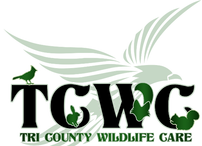RACCOONS are primarily nocturnal, but may be seen during the daytime too. They are omnivores, eating plant and animal material and are also attracted by water.
Raccoons are frequently attracted by garbage cans. Be sure to secure trash can lids and preferably keep them inside a shed or garage until pick up morning.
Mating season is usually January through March, but can occur much later depending on weather and food sources. An average litter is from 4-5 pups and ideally raccoons can be excluded with their young prior to their entry being sealed.
Raccoons will leave tunnels in insulation and their droppings are usually large/ cat sized. Their point of entry is usually obvious. There are many ways they can be convinced to move out.
Alternate points of entry should be well secured to avoid their utilizing multiple entry points prior to implementing deterrents. 1/2 inch metal wire is recommended to secure vents and other possible entry points. To encourage them to move out, you may place a bright light within their chosen area and play a battery operated radio. Another deterrent would be to soak 3-5 tennis balls in ammonia and to toss them into their nesting area.
To monitor their access, stuff wrinkled newspaper into the access point. Once the newspaper is no longer disturbed, you may secure this access as well.
Next, boil one cup of cayenne pepper in 1 quart water and allow to cool. Place liquid into a spray bottle and while wearing goggles and a mask, spray the entry points to deter the raccoons from returning. They will follow their nose to a nest and this can be a strong deterrent.
Some publications recommend using cayenne in bird seed to deter raccoons. We do not recommend this because it is toxic to bees and other beneficial pollinators.
Raccoons also love grubs and may tear up lawns to get at them. These grubs will also make brown spots in your lawn, so the solution is to either get beneficial nematodes which will go to work to naturally eat the grubs or spray a pesticide recommended by your nursery for the specific time of year to kill grubs.
Raccoons are one of the mammals considered to be a rabies vector species even though only a very small number will carry rabies. They also carry a species specific roundworm that can be inhaled or ingested that is shed in their feces which can be harmful to humans. Leptospirosis is another disease that they carry which can be spread to humans and pets.
Distemper is a virus that can be spread from raccoons to pets, but not to humans. Keep pet vaccinations current to protect your pets and keep them away from wildlife for the safety of both of them.
We are happy to help you with your individual problem. Please call 209-283-3245 for advice.
Raccoons are frequently attracted by garbage cans. Be sure to secure trash can lids and preferably keep them inside a shed or garage until pick up morning.
Mating season is usually January through March, but can occur much later depending on weather and food sources. An average litter is from 4-5 pups and ideally raccoons can be excluded with their young prior to their entry being sealed.
Raccoons will leave tunnels in insulation and their droppings are usually large/ cat sized. Their point of entry is usually obvious. There are many ways they can be convinced to move out.
Alternate points of entry should be well secured to avoid their utilizing multiple entry points prior to implementing deterrents. 1/2 inch metal wire is recommended to secure vents and other possible entry points. To encourage them to move out, you may place a bright light within their chosen area and play a battery operated radio. Another deterrent would be to soak 3-5 tennis balls in ammonia and to toss them into their nesting area.
To monitor their access, stuff wrinkled newspaper into the access point. Once the newspaper is no longer disturbed, you may secure this access as well.
Next, boil one cup of cayenne pepper in 1 quart water and allow to cool. Place liquid into a spray bottle and while wearing goggles and a mask, spray the entry points to deter the raccoons from returning. They will follow their nose to a nest and this can be a strong deterrent.
Some publications recommend using cayenne in bird seed to deter raccoons. We do not recommend this because it is toxic to bees and other beneficial pollinators.
Raccoons also love grubs and may tear up lawns to get at them. These grubs will also make brown spots in your lawn, so the solution is to either get beneficial nematodes which will go to work to naturally eat the grubs or spray a pesticide recommended by your nursery for the specific time of year to kill grubs.
Raccoons are one of the mammals considered to be a rabies vector species even though only a very small number will carry rabies. They also carry a species specific roundworm that can be inhaled or ingested that is shed in their feces which can be harmful to humans. Leptospirosis is another disease that they carry which can be spread to humans and pets.
Distemper is a virus that can be spread from raccoons to pets, but not to humans. Keep pet vaccinations current to protect your pets and keep them away from wildlife for the safety of both of them.
We are happy to help you with your individual problem. Please call 209-283-3245 for advice.


